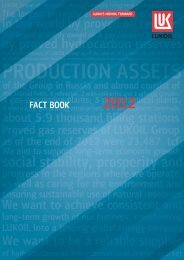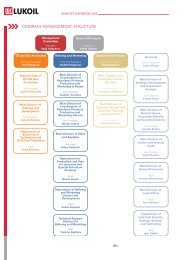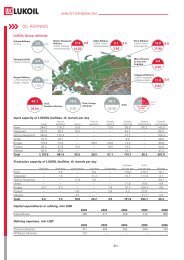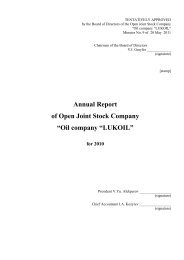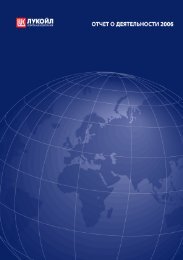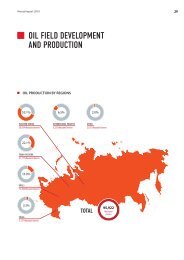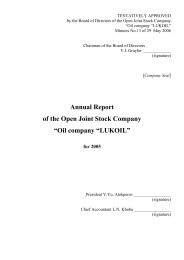ANNUAL REPORT 2005 - Lukoil
ANNUAL REPORT 2005 - Lukoil
ANNUAL REPORT 2005 - Lukoil
Create successful ePaper yourself
Turn your PDF publications into a flip-book with our unique Google optimized e-Paper software.
TAXATION OF DIVIDENDS AND CAPITAL GAINS<br />
The following discussion is a summary of certain tax consequences under the laws of the Russian Federation and the<br />
United Kingdom for holders of our ordinary shares, including those ordinary shares that trade in the form of depositary<br />
shares, or DSs, whether in the form of American DSs or global DSs. The summary is general in nature and is based on<br />
the laws of the Russian Federation and the United Kingdom in effect as of the date of this annual report and is subject<br />
to any change in law that may take effect after such date. It does not purport to be a complete analysis of all tax considerations<br />
relating to DSs or ordinary shares, whether in those countries or elsewhere. You should consult with your tax<br />
advisors with respect to the precise Russian and UK tax consequences of acquiring, owning and disposing of our<br />
ordinary shares or DSs. The applicability of any double tax treaty relief will depend on the particular circumstances and<br />
facts relating to each relevant holder. In this regard, however, it is noted that there may be practical difficulties involved<br />
in claiming double tax treaty relief.<br />
Under no circumstances should you view this summary as tax advice.<br />
CONSOLIDATED FINANCIAL STATEMENTS<br />
RUSSIAN TAX CONSIDERATIONS<br />
This summary does not seek to address the applicability of any double tax treaty relief. With the enactment of the Profits<br />
Tax Chapter of the Russian Tax Code which became effective 1 January 2002 the advance treaty clearance procedure<br />
has been eliminated. However, this does not eliminate a risk of the tax authorities disputing the relief from withholding<br />
tax when they carry out a tax audit and requiring the tax agent to make payment of tax, penalties and interest.<br />
Non-resident holder<br />
For the purposes of this summary, a "non-resident holder" in relation to an individual means a physical person, physically<br />
present in the Russian Federation for less than 183 days in a given calendar year that holds and disposes of DSs or<br />
ordinary shares.<br />
For the purposes of this summary, a "non-resident holder" in relation to a legal entity is a legal person or organisation, in<br />
each case not organised under Russian law, that holds and disposes of DSs or ordinary shares otherwise than through a<br />
permanent establishment in Russia. Current Russian tax legislation does not provide for definition of residency, applicable<br />
to legal entities. In practice, it is possible to use the definition above as term, describing residency of legal entities in Russia.<br />
The Russian tax rules applicable to securities, and in particular to those held by non-resident holders, are characterised<br />
by significant uncertainties and by an absence of interpretative guidance. Russian tax law and procedures are not well<br />
developed and rules are sometimes interpreted differently by different tax inspectorates and inspectors. In addition both<br />
the substantive provisions of Russian tax law and the interpretation and application of those provisions by the Russian tax<br />
authorities may be subject to more rapid and unpredictable change than in a jurisdiction with more developed capital markets.<br />
The relevant chapters of Part Two of the Tax Code that set out the regulatory framework for the taxation of the<br />
income of individuals and the profits of Russian and foreign legal entities do not regulate all the issues arising in connection<br />
with the purchase, ownership and disposition of shares and DSs by non-resident holders. In particular, the Russian<br />
tax authorities have not provided profound guidance regarding the treatment of the share deposit arrangements of the<br />
type relating to DSs.<br />
Taxation of Dividends<br />
Dividends paid to a non-resident holder generally are subject to Russian withholding tax, which will be withheld by us<br />
acting as a tax agent. The applicable tax rate on dividends will depend on whether the dividend recipient is a legal<br />
entity or an individual. Dividends paid to a non-resident holder that is a legal entity generally will be subject to Russian<br />
withholding tax at a rate of 15%. Dividends paid to non-resident individuals are subject to Russian withholding tax at a<br />
rate of 30%, according to the Tax code of the RF. Russia has current double tax treaties (DTTs) with quite a wide range<br />
of countries, where the respective rates for the taxation of dividends are lower. For instance, according to DTT between<br />
Russia and the UK, the relief tax rate for non-resident individuals is 10%.<br />
Russian tax reporting obligations of a non-resident individual<br />
If income received by a non-resident-holder (who is an individual) is treated as taxable in Russia but has not been withheld<br />
for any reason (e.g. paid by foreign company) such an individual is technically liable to declare his or her income to<br />
the Russian tax authorities and pay the tax.<br />
Withholding tax may be reduced under the terms of a double tax treaty between the Russian Federation and the country<br />
of residence of the non-resident holder. For example, the Convention Between the Government of the Russian Federation<br />
175



